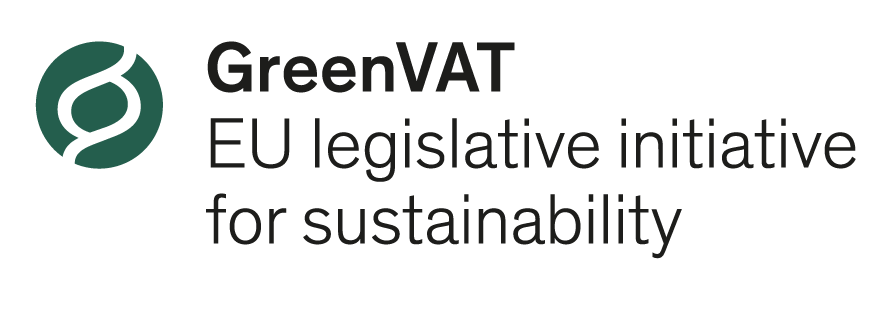Climate protection in EU VAT law: The EU citizens’ initiative GreenVAT
Dr Sandro Nücken, a specialist lawyer for tax law, welcomes the European citizens’ initiative GreenVAT. GreenVAT was initiated by the entrepreneur and VAT expert Roman Maria Koidl. It calls for reduced VAT rates on sustainable, ecological and environmentally friendly products and services across Europe.
Berlin, 22.07.2022
With the “European Green Deal”, the EU Commission presented a strategy in December 2019 to meet the challenges of climate change. The overarching goal is climate neutrality for the EU by 2050. In addition to the planned revision of climate, energy and transport-related legislation, the adaptation of tax law is also intended to contribute to a climate-friendly and resource-conserving economy. With the EU Council Directive on the Modernisation of EU VAT Rates of 05/04/2022, the idea of climate protection has also found its way into European VAT law for the first time. It is not only the Council of the EU that presents proposals on how to promote sustainability through a revised VAT system. With GreenVAT, the European Citizens’ Initiative is currently drawing attention to itself with its demand for tax reductions for ecological, environmentally friendly and sustainable products. What is the concrete goal of this initiative? What are the plans for a sustainable redesign of the EU VAT system, and what impact can these have on businesses in Germany? We talk about this with Roman Maria Koidl, entrepreneur and initiator of the European citizens’ initiative GreenVAT, and with Dr Sandro Nücken, partner at Ebner Stolz in Munich and expert in VAT law.

Mr Koidl, you launched the European Citizens’ Initiative GreenVAT. What exactly is behind this initiative, and what do you want to achieve with it at European level?
Roman Maria Koidl: The European Citizens’ Initiative is an instrument at the level of the European Commission that enables all citizens to have a say in legislation in the European Union. Any EU citizen can launch an initiative asking the Commission to act on a specific issue.
The basis is the European Commission’s right of initiative, which can itself submit a legislative initiative to the European Parliament. The advantage of a citizens’ initiative is that, if successful, it can have an EU-wide impact because the member states of the Union have to implement the EU’s requirements within a specified period of time. In our case, this would mean that Europe would get a GreenVAT, a green VAT on ecological, environmentally friendly and sustainable products.
Why can VAT reductions for organic, sustainably produced and environmentally friendly products contribute to mitigating climate change?
Dr Sandro Nücken: In VAT law, tax reductions can mainly be granted via reduced tax rates or tax exemptions. If these discounts are given for sustainable products, the expectation is that consumers will be more likely to choose these products. In principle, this also benefits the environment. EU VAT law, which is the basis for our national VAT law, has so far hardly taken the idea of sustainability into account. With the new EU directive, however, the EU has now taken countermeasures. Certainly, more will happen in this area in the future. For most products and services, it does not make any difference regarding VAT whether they fulfil sustainability criteria or not. The recent push by the German government for a possible adjustment of VAT on food according to its “climate friendliness” shows that there are more ideas here. In the context of comprehensive climate protection, I believe that a stronger orientation of VAT towards climate protection aspects can hardly be avoided.
As an entrepreneur, publicist, and patron of the arts, you, Mr Koidl, are active in a wide variety of subject areas and industries. How did the idea for this initiative come about, and what were your motivations for actually implementing it?
Roman Maria Koidl: We are currently seeing that VAT cuts are a tried and tested means of alleviating the consequences of crises, most recently during the corona pandemic. Why not use VAT as an incentive tax across the EU to make progress on environmental protection and ecological change? With the Green Deal, the European Union is pursuing the ambitious goal of becoming CO₂-neutral by 2050, i.e. to fully offset CO₂ emissions. A reduction in sales tax rates for so-called “green” products could lead to a change in consumer thinking. Environmentally friendly and sustainable products are increasingly in demand. Consumers who have always shopped consciously would be relieved by the effective price reductions. The idea for this initiative came from the object of my company eClear, which offers e-commerce merchants automated VAT reporting solutions for cross-border B2C business. There are no uniform rules in Europe regarding VAT rates. Rather, each member state has its own, sometimes very detailed, regulations regarding the amount of VAT to be assessed. In addition, there are hundreds of thousands of exceptions. The common feature is that VAT is assessed in each EU Member State. Nowadays, databases offer tax rates in “real time”. This eliminates the horror regarding follow-up costs for companies in the event of changes. Granularity (in terms of products and services) and timeliness (e.g. temporary reductions) in VAT rates are no longer obstacles. I have not the slightest doubt that the sales tax will become an instrument of political control.
And at what point in this process is the GreenVAT citizens’ initiative currently? What hurdles still need to be overcome?
Roman Maria Koidl: First, the team of at least seven organisers had to be put together, as required by regulation. These must all be Europeans and reside in seven different European Member States. Before publishing a citizens’ initiative, the EU Commission checks whether it also has the corresponding legislative competence and whether the initiators’ concern does not merely serve a commercial purpose. If a citizens’ initiative is launched, the organisers have one year to collect at least one million signatures.
To get Europe’s citizens to sign, they need to know about the initiative, and the only way to do that is to go public. That is why I am happy about any support, as well as from Ebner Stolz. But also the Parliamentary State Secretary in the Federal Ministry for the Environment, Chris Kühn, supports the initiative.
Provided that the citizens’ initiative is successful, and it then proceeds with implementation. How can the demands be integrated into the current EU VAT law, and what would that mean for the member states? Does this then have to be implemented accordingly in all member states?
Dr Sandro Nücken: If the initiative is successful, the best-case scenario would be a proposal for a directive by the EU Commission that would concretise the demands of the initiative. If a final directive on Green VAT is then agreed at EU level, the member states would in principle be obliged to transpose the directive into national law. But here the devil is in the detail. It will depend on what the member states can agree on and whether derogation rights have to be accepted again for certain member states. Furthermore, It is conceivable that the member states do not have to transpose all the directive’s standards, but that there are options in certain areas. We know something like this from the current VAT system directive. Transitional arrangements will also play a role.
And what impact would this have on companies?
Roman Maria Koidl: Entrepreneurs are only successful if the product they offer finds sales. The price of a product always plays an essential role. Reduced sales or VAT rates would lead to an alignment of prices of “green” and conventional products. If a sustainable product costs less than a conventional product, this naturally influences the consumer’s purchase decision.
Dr Sandro Nücken: In my opinion, it is conceivable that VAT will also be used as an overarching indicator for the climate and environmental friendliness of a company in the future. This could play a role in ESG or CSR reporting, for example. The criterion would then be the share of tax-reduced or tax-exempt services in the total services of the enterprise. The higher, the better for sustainability ratings. Whether something like that actually comes will have to be seen. However, the topic of Green VAT will certainly become increasingly important in everyday business life in the future.
Let’s look beyond the citizens’ initiative to other EU measures in climate protection and sustainability: the EU is pursuing the goal of being the first continent to be climate neutral by 2050. Are there already concrete plans as to how this goal can be achieved in tax law, in particular in taxation? In value added tax, can be implemented?
Dr Sandro Nücken: The EU has not yet presented a real master plan for this. The approach so far has been more case-by-case and could be described as a “policy of small steps”. With the new directive, several issues have been implemented in VAT. For example, Member States can now subject the installation of solar panels and the sale of e-bikes and bicycles to the reduced tax rate. We know this approach of small steps from other areas of VAT. The fundamental problem is that, as a rule, consensus must be reached among all EU member states, which is often a difficult undertaking. Action at EU level in VAT therefore mostly only implements the lowest common denominator. I do not see a comprehensive reform of the EU VAT system towards an ecological tax system at the moment.
In your opinion, to what extent can such tax measures have an influence on the transformation of the economy towards more climate and environmental protection, and which measures do you consider to be particularly effective?
Roman Maria Koidl: Producers always orient themselves towards their consumers. In the past few years, a clear trend towards sustainable production and ecological products could already be seen. Consumers want this, even airlines are asked by their customers: “What are you doing in sustainability”? If sustainable products were consumed more as a result of tax cuts, the economy would naturally follow suit and invest more in research and environmentally friendly and sustainable production and products. A win-win situation for everyone.
Dr Sandro Nücken: Of course, steering taxes are controversial, and I do not always consider them to be effective. The temporary reduction in VAT in the second half of 2020 in the face of the corona pandemic has shown us that short-term steering measures through tax law often do more harm than good. But I see things differently when it comes to climate and environmental protection. This is a long-term issue that cannot be addressed with short-term measures alone. Incentives for climate protection must be anchored in all areas of society, and in my opinion this also includes tax law. Value-added tax in particular comes to the fore here due to its enormous revenue strength and broad impact. Moreover, tax rate reductions in general always have a strong psychological effect on economic operators. In addition, media attention is often high when it comes to tax rate reductions. In this respect, I do believe that VAT law can exert an influence towards a more sustainable economy.
. Supporters of the GreenVAT initiative can sign on the European Commission’s website (https://europa.eu/citizens-initiative/initiatives/details/2021/000011_de). Contact person: Brigitta Hartmann bha@greenvat.org Tel.: +49 30 23590 7104

Leave a Reply